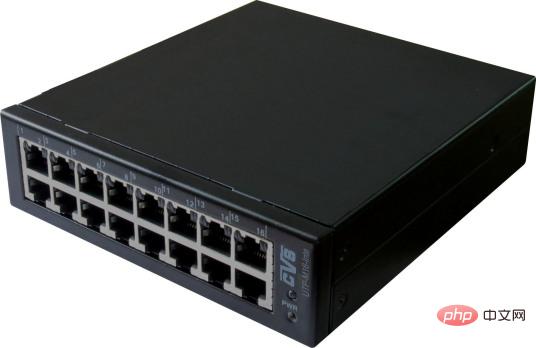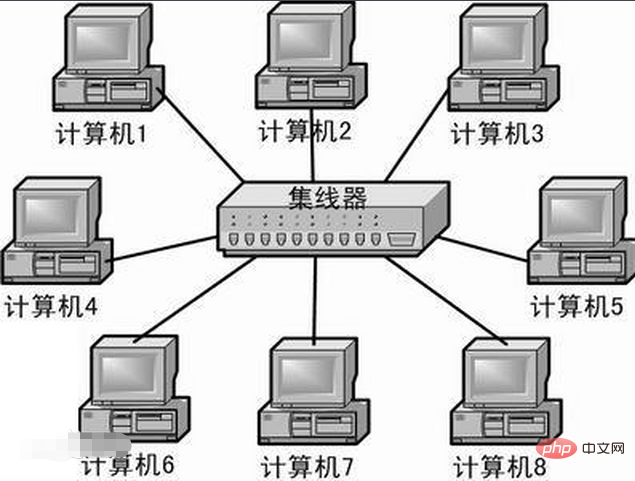What is the function of hub
A hub refers to a device that connects multiple Ethernet twisted pairs or optical fibers together under the same physical medium. Its function is to regenerate, shape and amplify the received signal to expand the transmission distance of the network. , while concentrating all nodes on the node centered on it. The hub does not have the MAC address table that the switch has, so when it sends data, it is not targeted, but sends it in a broadcast manner; that is to say, when it wants to send data to a node, it does not send the data directly to the destination. node, but sends the packet to all nodes connected to the hub.

The operating environment of this tutorial: Windows 7 system, Dell G3 computer.
What is a hub? What is the use?
A hub refers to a device that connects multiple Ethernet twisted pairs or optical fibers together under the same physical medium. A hub is the physical layer that operates in the OSI model. It can be regarded as a multi-port repeater. If it detects a collision, it will submit a blocking signal.
The main function of the hub is to regenerate, shape and amplify the received signal to expand the transmission distance of the network, while concentrating all nodes on the node centered on it. It works on the first layer of the OSI (Open Systems Interconnection Reference Model) reference model, which is the "physical layer". Hubs, like network cards, network cables and other transmission media, are basic devices in the local area network and adopt CSMA/CD (Carrier Sense Multiple Access Technology with Conflict Detection) media access control mechanism. Each interface of the hub simply sends and receives bits. If it receives a 1, it will forward a 1. If it receives a 0, it will forward a 0. No collision detection is performed.

The hub is a pure hardware network bottom device and basically does not have the "intelligent memory" and "learning" capabilities similar to switches. It also does not have the MAC address table that the switch has, so when it sends data, it is not targeted, but uses broadcast mode to send it. That is to say, when it wants to send data to a certain node, it does not send the data directly to the destination node, but sends the data packet to all nodes connected to the hub.

HUB is a multi-port repeater. When HUB is used as the central device, if a certain line in the network fails, it will not affect the work of other lines. Therefore, HUB has been widely used in local area networks. Most of the time, it is used in star and tree network topologies, and is connected to each host through an RJ45 interface (there are also BNC interfaces). There are many types of HUB according to different sayings.
Description:
The hub (HUB) is a basic device in the data communication system and has a traffic monitoring function. Like transmission media such as twisted pairs, it is a hardware device that does not require any software support or requires very little management software management. It is widely used in various occasions. Hubs work in a local area network (LAN) environment and are called physical layer devices. The hub uses electrical interconnection inside the hub. When the environment for maintaining the LAN is a logical bus or ring structure, the hub can be used to establish a physical star or tree network structure. In this regard, the hub acts as a multi-port repeater. In fact, a hub is actually a type of repeater. The only difference is that the hub can provide more port services, so the hub is also called a multi-port repeater.
The method of broadcasting data sent by this device has three shortcomings:
(1) User data packets are sent to all nodes, which is likely to cause insecurity in data communication, and some people with ulterior motives may It is easy to illegally intercept other people's data packets.
(2) Since all data packets are sent to all nodes at the same time, coupled with its shared bandwidth method (if two devices share a 10M hub, then each device only has 5M bandwidth), it is even more It may cause network traffic jams and further reduce network execution efficiency.
(3) Non-duplex transmission, low network communication efficiency. Each port of the hub can only carry out data communication in one direction at the same time, and cannot perform bidirectional duplex transmission like a switch. The network execution efficiency is low and cannot meet the communication needs of larger networks.
If you want to read more related articles, please visit PHP Chinese website! !
The above is the detailed content of What is the function of hub. For more information, please follow other related articles on the PHP Chinese website!

Hot AI Tools

Undresser.AI Undress
AI-powered app for creating realistic nude photos

AI Clothes Remover
Online AI tool for removing clothes from photos.

Undress AI Tool
Undress images for free

Clothoff.io
AI clothes remover

Video Face Swap
Swap faces in any video effortlessly with our completely free AI face swap tool!

Hot Article

Hot Tools

Notepad++7.3.1
Easy-to-use and free code editor

SublimeText3 Chinese version
Chinese version, very easy to use

Zend Studio 13.0.1
Powerful PHP integrated development environment

Dreamweaver CS6
Visual web development tools

SublimeText3 Mac version
God-level code editing software (SublimeText3)

Hot Topics
 1386
1386
 52
52


